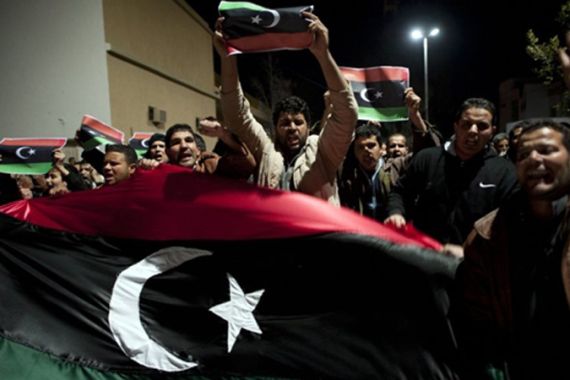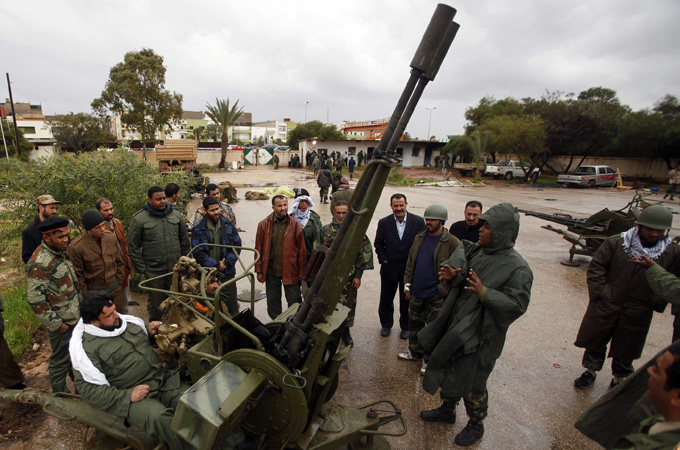Gaddafi rivals close in on Tripoli
Areas near capital fall to protesters amid fears that forces loyal to Libyan leader could launch counter-attack.

Libya’s opposition movement has seized control of territory close to the capital, Tripoli, as anti-government protesters gear up for what could be a final battle for leader Muammar Gaddafi’s stronghold.
Three areas in the east were reported to be under the control of protesters on Monday, a day after pro-democracy demonstrators took control of the city of Az-Zawiyah, just 50km west of Tripoli.
Men opposed to Gaddafi patrolled the streets of Az-Zawiyah, saying they had seized weapons and even tanks which they would use to defend themselves.
| LIVE BLOG |
 |
But they were also bracing themselves for a potential showdown with forces loyal to Gaddafi, who have reportedly surrounded the city.
Ezeldina, a Zawiyah resident, told Al Jazeera that people in the city had raided military camps to prepare for a potential raid by government forces.
“We are expecting an attack at any moment,” he said. “We are forming rotating watch groups, guarding the neighbourhood.”
Pro-Gaddafi rallies
Government forces manned several checkpoints between Az-Zawiyah and the capital, and supporters of the Libyan leader demonstrated in the Harsha district, 5km from the centre of Zawiyah.
Government loyalists also took to the streets just outside the capital, waving posters and chanting slogans.
The rallies appeared to be evidence that Gaddafi had not lost complete control of the capital.
Ibrahim Sharquieh, deputy director of the Brookings Doha Centre, said the battle between pro- and anti-Gaddafi forces for Tripoli is not likely to be won immediately.
“We know that [Gaddafi] is in the Bab al-Aziziya area [of Tripoli] and Bab al-Aziziya seems to be very secure. He has his militia around him and they are doing a good job protecting him,” Sharquieh told Al Jazeera.
“He has even made some attacks outside the Bab al-Aziziya area.
“We can comfortably say that he is still in control in Tripoli. Although there is some resistance in some areas I don’t think we can talk about the city falling today or tomorrow.”
‘US assistance’
Meanwhile, the calls for Gaddafi to step down multiplied, with the Canadian and British prime ministers urging the Libyan leader to leave.
 |
| Follow more of Al Jazeera’s special coverage here |
Their calls come as the US secretary of state prepares for crisis talks in Switzerland. Hillary Clinton is due to meet other foreign ministers on the sidelines of a UN human rights meeting in Geneva on Monday.
Speaking ahead of the meeting, Clinton called for an end to the bloodshed in Libya.
“First we have to see the end of his regime and with no further bloodshed,” she said, adding that Washington is eager for his ouster “as soon as possible”.
“We want him to leave.”
Clinton also said that Washington was “reaching out” to opposition groups, prepared to offer “any kind of assistance” to Libyans seeking to overthrow the regime.
However, opponents of Gaddafi forming a National Libyan Council in the east said they did not want any foreign intervention in the country.
Blaming al-Qaeda
Despite the international calls for him to step down, Gaddafi has remained defiant.
In an interview with Serbian television, Gaddafi repeated his message that he will stay in Libya and blamed foreigners and al-Qaeda for the unrest that is threatening his more than 41-year rule.
The interview with TV Pink in Belgrade was carried out over the phone while Gaddafi was in his office in Tripoli.
The Libyan leader also condemned the United Nations Security Council for imposing sanctions on him and launching a war crimes inquiry.
 |
| An opposition army officer teaches the use of an anti-aircraft gun to civilians in Benghazi [Reuters] |
Gaddafi said the UN council could not see that the capital, Tripoli, was secure.
Earlier, Gaddafi’s son denied in a US television interview that turmoil was sweeping the country and said the military did not use force against the people, despite reports to the contrary.
There was a “big, big gap between reality and the media reports,” Gaddafi’s son, Saif al-Islam Gaddafi, told ABC News’ “This Week” television programme. “The whole south is calm. The west is calm. The middle is calm. Even part of the east.”
His assessment came as much of the oil-producing regions, including the second city of Benghazi, was in protesters’ hands.
Saif Gaddafi also denied allegations that the military was targeting Libyan citizens.
“Show me a single attack, show me a single bomb,” he said in the interview. “The Libyan air force destroyed just the
ammunition sites. That’s it.”
However, the death toll from the violent crackdown on protesters is estimated by some diplomats to be about 2,000.